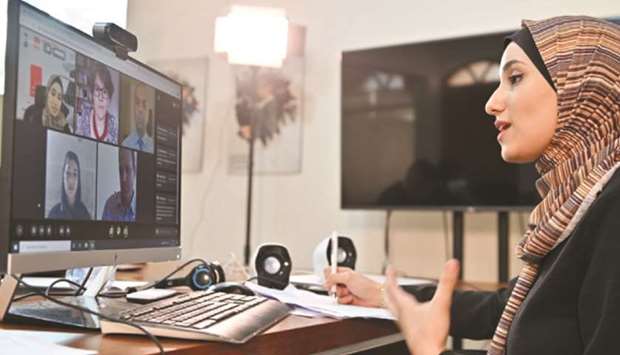Education Above All (EAA) Foundation’s programme Al Fakhoora, with the support of its strategic partner Qatar Fund for Development, and in partnership with UNDP’s Programme of Assistance to the Palestinian People, successfully conducted the first completely student-led virtual conference, ‘Rethinking Higher Education: A New Way of Learning to Become’, recently.
The webinar series was developed and conducted by Palestinian students from Gaza and the West Bank, and Syrian refugees from across the Mena region who are directly affected by Covid-19 as an additional challenge to the already complex situations in which they live.
The aim of the conference was to address key aspects of higher education that have been affected by Covid-19 in the Mena region, specifically related to marginalised youth, focusing on four main perspectives: that of policymakers, INGOs, educational experts and, most importantly, the youth themselves.
During the opening session, Stefania Giannini, Unesco assistant director-general for education, said: “Education is public good and a fundamental human right. Unesco projects that 70mn children and youth are at the risk of not returning to care centres, schools and universities in 2020. It is a very concrete risk now. The highest reduction is expected at tertiary level with 5mn people at risk. We will not overcome the current education crises without the renewed global commitment and inclusion.”
The conference featured five panels focusing on four main themes: Online Learning, E-work, Mental Health, and Community in Times of Crisis. Beneficiaries of the Al Fakhoora Scholarship and Empowerment programme moderated and participated in these panels, alongside experts from different fields. Discussions centred on defining a new “better normal” and on ensuring that marginalised youth, who are already affected by conflict, are not excluded from this global dialogue that, in so many ways, will shape their future.
Mubarak al-Thani, communication manager and head of advocacy at EAA Foundation, said: “The topics addressed in the conference, ‘Rethinking Higher Education: A New Way of Learning to Become’ are of great importance to our shared global development. We must take the lessons of innovation and problem solving being used during this crisis, forward to reach our sustainable development goals. The leading role of youth in designing and organising such conferences not only enhances their capabilities and boosts their self-confidence, but it also gives them a voice in shaping a more sustainable, equitable and just future.”
In its Human Development Report, UNDP has warned that the digital divide is reopening gaps that had closed in the education sector taking us back to a time before the Sustainable Development Goals or even the Millennium Development Goals, and threatening the hard work of the past 30 years.
Yvonne Helle, UNDP special representative of the administrator, highlighted that the pandemic also presents an opportunity to make societies more inclusive and efficient. “Higher education has a role to play in shaping the Covid-19 future and triggering a learning revolution that will lead to a world that uses technology in a smart way, create opportunities for all people to learn and access jobs wherever they are in the world.”

From the EAA online conference.
